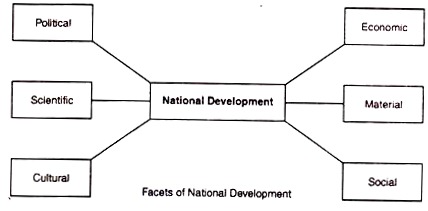
The term national development is very comprehensive. It includes all aspects of the life of an individual and the nation.
It is holistic in approach. It is a process of reconstruction and development in various dimensions of a nation and development of individuals.
It includes full-growth and expansion of our industries, agriculture, education, social, religious and cultural institutions. Moreover, national development implies development of a nation as a whole. It can be best defined as the all-round and balanced development of different aspects and facets of the nation viz. political, economic, social, cultural, scientific and material.

John Vaizey, noted economist defines:
“National development is the total effect of all citizen forces and addition to the stock of physical, human resources, knowledge and skill.”
United Nations Decade Report has defined it as:
“National development is growth plus change. Change in turn is social and cultural as well as economic and qualitative as well as quantitative”.
Broadly, development of the nation encapsulates such parameters as:
(i) Development through a planned national economy,
(ii) Increase in agricultural production through application of modern technical know-how,
(iii) harnessing industrial production,
(iv) Development of human resource,
(v) Application of science and technology in production sector,
(vi) provision of mass education and
(vi) Provision of various facilities to meet the needs and aspirations of disadvantaged, deprived and poorest of the poor segments of population.
These are the some of the problems of national development:
(i) Tardy economic growth in terms of G.N.P. and standard of living.
(ii) Large scale unemployment and under-employment.
(iii) Large pool of illiteracy.
(iv) Rapid growth of population.
(v) Challenges of national and emotional integration.
(vi) Inertia to change process.
(vii) Slow process of modernisation.
(viii) Problem of evolving a democratic, socialistic and secular order.
(ix) Incidence of poverty and poor standard of living.
(x) Phenomenon of urbanisation and its allied malaise.
(xi) Lethargic attitude of people to the core value of work and unwillingness to take responsibility.
(xii) Mismatch between moral and scientific values.
(xiii) Rise of phenomenon of brain-drain.
(xiv) Useless and low quality products of institutions of higher learning.